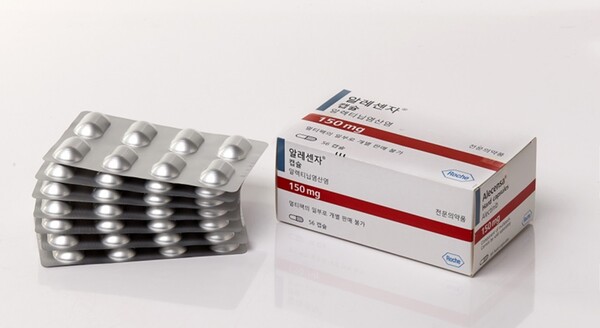Roche Korea said its anaplastic lymphoma kinase (ALK)-positive non-small cell lung cancer (NSCLC) treatment, Alecensa (alectinib), has received approval from the Ministry of Food and Drug Safety as adjuvant therapy following complete tumor resection in ALK-positive NSCLC patients.

The expanded approval allows Alecensa to be used for patients with locally advanced or metastatic ALK-positive NSCLC and those in the early stages of the disease. Thus, Alecensa has become the first tyrosine kinase inhibitor (TKI) in Korea approved as an adjuvant treatment for early-stage ALK-positive NSCLC following surgery.
Early-stage NSCLC poses a significant risk of recurrence, with about 30-55 percent of patients experiencing a return of the disease after surgery, which can lead to fatal outcomes.
Therefore, it is crucial to reduce the risk of recurrence through appropriate treatment options from the outset. Recent global treatment guidelines also recommend adjuvant therapy after surgery to reduce the risk of recurrence and improve patient survival.
The approval was based on the ALINA study involving 257 patients with stages 1B to 3A ALK-positive NSCLC.
The study compared the efficacy of Alecensa as adjuvant therapy with platinum-based chemotherapy.
Results showed that Alecensa reduced the risk of disease recurrence or death by 76 percent compared to chemotherapy. Also, Alecensa decreased the risk of recurrence or death in the central nervous system (CNS) by 78 percent.
Alecensa's safety profile remained consistent with previous studies in metastatic patients, and no new safety concerns were identified.
The clinical benefits of Alecensa were also observed in Asian patients, including Koreans. In a subgroup analysis of 140 Asian patients from Korea, China, Japan, Taiwan, and Thailand, Alecensa reduced the risk of disease recurrence or death by 61 percent compared to platinum-based chemotherapy and lowered the risk of CNS recurrence or death by 76 percent.
“ALK-positive lung cancer, which typically affects younger patients compared to other forms of NSCLC, presents significant challenges due to the high risk of CNS metastasis following recurrence,” said Professor Ahn Jin-seok from the Department of Hematology-Oncology at Samsung Medical Center. “The approval of Alecensa for early-stage ALK-positive lung cancer patients as adjuvant therapy marks a significant milestone in reducing the risk of recurrence and mortality. We expect this will positively change the treatment landscape for NSCLC in Korea.”
Roche Korea General Manager Izat Azem said, “We are delighted to extend Alecensa's benefits to patients with early-stage ALK-positive NSCLC, following its success in treating metastatic cases.”

